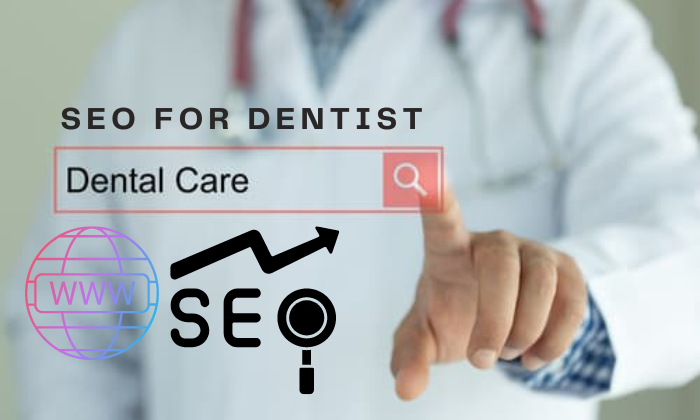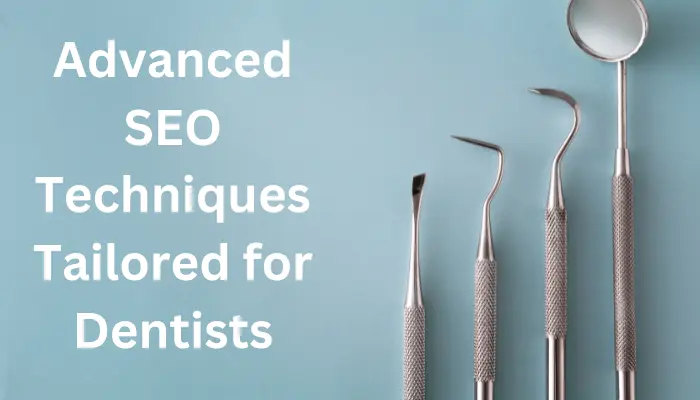Local SEO Services Near Me | Local Pro1 Welcome to...
Dental Domination: Mastering SEO for Dentists
Dental Domination| Mastering SEO for Dentists
In the competitive landscape of the modern business world, having a strong online presence is crucial for any industry, and the dental field is no exception. Search Engine Optimization (SEO) services plays a pivotal role in enhancing the visibility and accessibility of dental practices on search engines like Google, Bing, and Yahoo. For dentists, implementing effective SEO strategies can lead to increased brand recognition, a larger patient base, and ultimately, greater revenue generation. Local pro1 will provide you best services related to SEO for dentists.

Key Elements of On-Page SEO for Dental Offices
Keyword Research: Identify relevant keywords related to dental services, location, and specialties. Use tools like Google Keyword Planner to find high-volume, low-competition keywords.
Title Tags: Create unique and compelling title tags for each page, including relevant keywords. Keep titles concise (around 50-60 characters) and include the dental office’s name.
Meta Descriptions: Craft informative meta descriptions (150-160 characters) that encourage clicks. Include key services, location, and a call-to-action to prompt user engagement.
Header Tags: Use header tags (H1, H2, H3, etc.) to structure content hierarchically. Incorporate target keywords in headers to improve readability and SEO.
URL Structure: Create SEO-friendly URLs that include relevant keywords and are easy to understand. Avoid generic or complex URLs; use hyphens to separate words.
Quality Content: Produce high-quality, informative content that addresses the needs and concerns of potential patients. Include engaging images and videos related to dental services.
Local SEO: Optimise for local search by including the dental office’s name, address, and phone number (NAP) consistently across the website. Create and optimise a Google My Business (GMB) profile.
Mobile Optimization: Ensure the website is mobile-friendly for users on smartphones and tablets. Google considers mobile-friendliness as a ranking factor.
Page Speed: Optimise website speed for a better user experience and improved search rankings. Compress images, minimise CSS and JavaScript files, and leverage browser caching.
User Experience (UX): Improve website navigation to enhance the user experience. Make it easy for visitors to find information about services, contact details, and appointment scheduling.
Internal Linking: Include internal links to relevant pages within the website to guide users and search engines through the content. Use descriptive anchor text for internal links.
Schema Markup: Implement schema markup to provide search engines with additional context about the content on the website. This can enhance the display of rich snippets in search results.
Social Integration: Connect social media profiles to the website. Encourage social sharing of content to increase visibility and engagement.
Local SEO for Dentists

The Significance of Local SEO for Dental Practices: Local SEO (Search Engine Optimization) is crucial for dental practices because it helps them reach potential patients in their local area when they’re actively searching for dental services. Many people turn to search engines like Google to find local businesses, including dentists. Optimizing for local SEO increases your visibility in search results, which can lead to more website visits, phone calls, and appointments. It’s especially important for dentists, as people often prefer to receive dental care from a nearby and convenient location.
Setting Up and Optimizing Google My Business: Google My Business (GMB) is a powerful tool for local businesses, including dental practices.
Claim and Verify Your Listing: Claim your GMB listing and go through the verification process to confirm your practice’s legitimacy.
Complete Your Profile: Fill out all the relevant information accurately, including business name, address, phone number, website, business hours, and a description of your dental services.
Choose Categories: Select the appropriate categories for your practice, such as “Dentist,” “Dental Clinic,” or other relevant options.
Add Photos: Include high-quality photos of your dental office, staff, waiting area, treatment rooms, and any other relevant images.
Manage Reviews: Respond promptly and professionally to all reviews, both positive and negative. Encourage satisfied patients to leave reviews.
Utilize Posts: Use GMB posts to share updates, promotions, and relevant information about your dental services.
Geo-Tagged Content: Include geo-tagged keywords in your business description and posts to help with local relevance.
Acquiring Positive Reviews and Ratings: Positive reviews and ratings play a crucial role in local SEO and building trust with potential patients.
Provide Excellent Service: The foundation of positive reviews is excellent patient care. Deliver high-quality dental services and a positive patient experience.
Ask Satisfied Patients: Politely ask satisfied patients to leave reviews on platforms like Google, Yelp, and Healthgrades. You can do this through follow-up emails, post-appointment cards, or signage in your office.
Simplify Review Process: Make it easy for patients to leave reviews by providing direct links to your review profiles. Include these links on your website and in email signatures.
Respond to Reviews: Engage with both positive and negative reviews. Thank patients for their feedback and address any concerns or criticisms professionally and constructively.
Monitor Online Reputation: Regularly monitor your online reputation and address any false or misleading reviews. Some platforms allow you to request the removal of fake or inappropriate reviews.
Share Positive Reviews: Showcase positive reviews on your website and social media to build credibility and trust with potential patients.
Content Marketing Strategies for Dental SEO
Keyword Research: Start by researching relevant dental keywords that potential patients might use when searching for information.
Quality Content: Write high-quality, informative blog posts that address common dental concerns, procedures, oral health tips, and answer frequently asked questions. Ensure the content creation is accurate, easy to understand, and genuinely helpful.
Long-Form Content: Longer blog posts (typically over 1000 words) tend to perform better in search engines. They allow you to thoroughly cover a topic, incorporate more keywords naturally, and demonstrate your expertise.
Structured Content: Organize your content using headings, subheadings, bullet points, and numbered lists. This makes your content easier to read and helps search engines understand the structure of your information.
Visuals: Incorporate relevant images, infographics, and diagrams to enhance the visual appeal of your content. Visuals can help explain complex concepts and keep readers engaged.
Internal and External Links: Include links to relevant internal pages on your website as well as credible external sources. This helps improve the user experience and signals search engines that your content is well-researched.
Consistent Publishing: Maintain a regular publishing schedule to keep your audience engaged and signal to search engines that your website is actively updated.
SEO For Dentists Make your blog posts easy to share on social media platforms by including social sharing buttons. This can help increase the reach of your content.
Creating Engaging Video Content for Patients:
Educational Videos: Produce videos that explain various dental procedures, oral hygiene tips, and answer common questions. Visual demonstrations can help patients understand complex topics better.
Patient Testimonials: Showcase real patient experiences and success stories through video testimonials. Authenticity can build trust with potential patients.
Live Q&A Sessions: Host live video sessions where you answer questions from your audience in real-time. This can help establish your authority and interact directly with patients.
Behind-the-Scenes: Give viewers a glimpse into your dental practice, introducing your team and showcasing the technology and equipment you use. This can humanize your practice and make it more relatable.
Optimize for SEO: When uploading videos to platforms like YouTube, use relevant keywords in your video titles, descriptions, and tags. This can help your videos appear in search results.
Transcriptions: Include transcriptions of your videos on your website. Search engines can’t directly interpret video content, so transcriptions help with indexing and accessibility.
Video Length: While the ideal length depends on the content, aim to keep videos concise and engaging. In general, shorter videos tend to perform better online.
Promotion: Share your videos on social media, embed them in blog posts, and include them in email newsletters to increase their visibility.
Advanced SEO Techniques Tailored for Dentists

Local SEO: Optimise Google My Business (GMB) profile with accurate business information, including name, address, phone number, and business hours. Encourage satisfied patients to leave positive reviews on your GMB profile. Create location-specific landing pages on your website to enhance local relevance.
Mobile Optimization: Ensure your website is mobile-friendly and provides a seamless experience on various devices. Optimise page speed for faster loading times, as mobile users tend to have less patience for slow websites.
Content Optimization: Create high-quality, informative content that addresses common dental concerns and questions. Use schema markup to provide search engines with structured data about your services, reviews, and location.
Video Content: Produce engaging video content showcasing your dental services, facilities, and patient testimonials. Optimise video titles, descriptions, and tags with relevant keywords.
Link Building: Develop a backlink strategy by obtaining links from reputable dental associations, local business directories, and health-related websites. Guest post on relevant blogs within the healthcare and local community.
Social Media Integration: Utilise social media platforms to share dental tips, success stories, and engage with the local community. Encourage social sharing of your content to increase visibility.
Technical SEO: Regularly audit your website for crawl errors, broken links, and duplicate content. Implement 301 redirects for any outdated or moved pages. Ensure secure connections (HTTPS) for improved security and search engine rankings.
Voice Search Optimization: Optimise content for conversational queries as voice search becomes more prevalent. Focus on natural language and FAQ-style content.
Monitoring and Analytics: Use tools like Google Analytics and Google Search Console to monitor website performance, user behaviour, and search queries. Adjust your SEO strategy based on the data insights gathered.
Conclusion
Search Engine Optimization (SEO) is essential for dentists to improve their online visibility, attract more patients, and establish a reputable online presence. Identify relevant keywords that potential patients are likely to use when searching for dental services. Optimize website pages with target keywords in titles, headings, and content. Create informative, patient-focused content that addresses common questions and concerns. Feel free to contact us for any type of query or services related to Dentists SEO.
FAQs
What Is Seo, And Why Is It Important For Dentists?
SEO, or Search Engine Optimization, is the practice of optimizing a website to improve its visibility on search engines like Google. For dentists, SEO is crucial to enhance online presence, attract more patients, and stay competitive in the digital landscape.
How Can Seo Benefit My Dental Practice?
SEO helps your dental website rank higher in search results, making it more likely for potential patients to find and choose your services. It increases online visibility, builds trust, and generates organic traffic to your website.
What Specific Seo Strategies Are Effective For Dental Websites?
Effective SEO strategies for dentists include optimizing website content with relevant keywords, creating a mobile-friendly site, obtaining quality backlinks, managing online reviews, and utilizing local SEO techniques to target the right audience in your area.
How Long Does It Take To See Results From Seo Efforts?
SEO is a gradual process, and the timeline for results can vary. Generally, it takes a few months to start seeing significant improvements. Consistency in implementing SEO strategies and adapting to algorithm changes contribute to long-term success.
Do I Need To Hire A Professional Seo Service For My Dental Practice?
While some basic SEO practices can be implemented by individuals, hiring a professional SEO service is recommended for comprehensive strategies and ongoing optimization. SEO experts have the knowledge and experience to navigate the complexities of search engine algorithms.
Our Services
Our Latest Posts
PPC White Label Services by Local Pro1 | Expert Solutions
PPC White Label Services by Local Pro1 | Expert Solutions...



